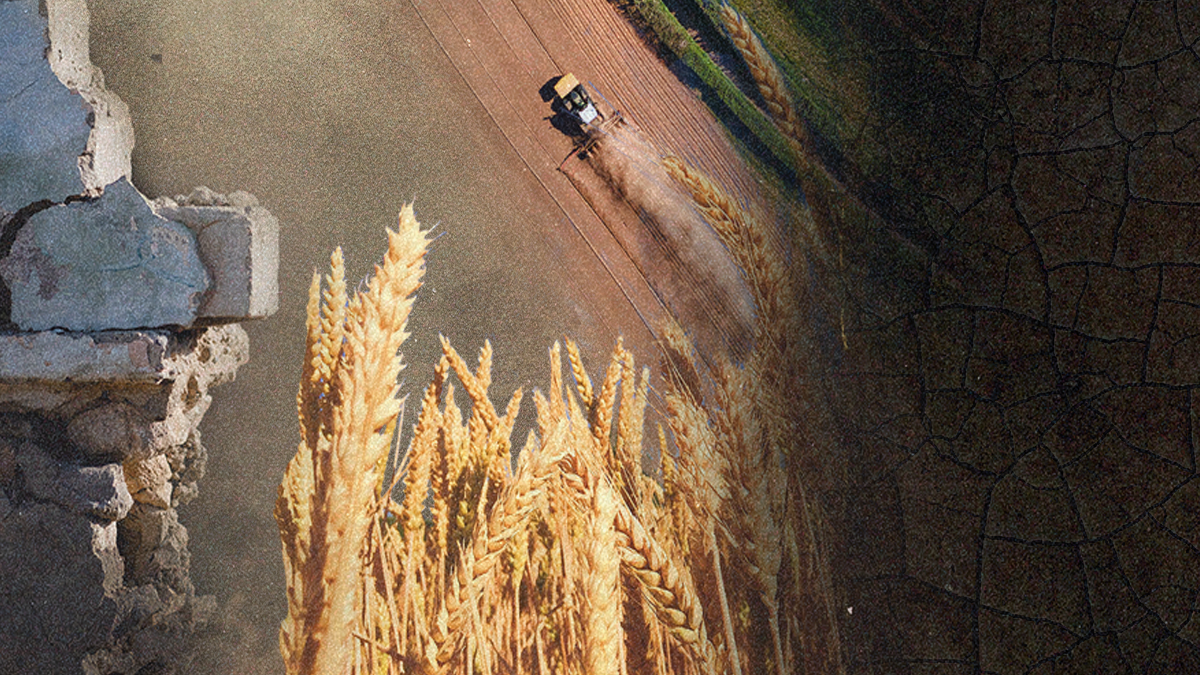May 23, 2022
Ukrainian President Volodymyr Zelensky on Monday served up a stark message to his audience at the World Economic Forum in Davos: we need your help so we can feed you.
With Russia’s war on Ukraine contributing to global shortages of wheat, cooking oils, and fertilizers, Zelensky called for European and UN help to establish export corridors for Ukrainian agriculture products that are currently trapped in Ukraine because of Russian naval blockades.
“Ukraine is short on time,” he said, “and I am not sure how much time Europe and the world have either.”
At this point, we know the war is driving up prices for food and energy around the world, stoking a crisis that the UN warns could push close to two billion people towards poverty and starvation.
What is less well understood is how bad it will get. A new report by our friends at Eurasia Group and the consultancy DevryBV Sustainable Strategies took a stab at answering this question.
The report says the most likely outcome of the war isn’t a massive escalation by Russia or a sudden outburst of doves crying for peace on both sides – but rather a more uncertain, protracted stalemate. After fierce fighting, this would mean that the Donbas and parts of southern Ukraine settle into “frozen conflicts,” sanctions remain in place, and no durable resolution appears.
That outcome — or rather, lack of a solution — will have devastating impacts globally, the report says, with little prospect of restoring Ukraine’s farming capacity or export routes, while sanctions and Kremlin countermeasures continue to push up the prices of Russian fertilizer and energy.
Under this scenario, the report says:
- More than 280 million people will be plunged into food insecurity this year.
- Those facing extreme poverty will rise by 200 million.
- Those on the edge of starvation will rise by 7 million.
Meanwhile, even in places where people aren’t pushed to the brink of famine, higher prices for basic foodstuffs will squeeze households, raising the prospect of social unrest. The Middle East, North Africa, and parts of South and Southeast Asia are at the highest risk, but the impacts will be felt everywhere.
Could an even worse scenario actually be … the best one? The report argues, somewhat counterintuitively, that a massive escalation by Russia could actually result in less of a food crisis globally.
Faced with more intense violence and an understanding that the conflict is deepening, the authors say, markets and governments would jump into action more quickly, dropping trade barriers, rustling up more humanitarian assistance, and working together to meet the challenge. Is this the crisis we need, anyone?
You can leaf through the whole Eurasia Group/DevryBV report here.
And for deeper coverage of the world’s growing food crisis, check out GZERO Media’s new Hunger Pains project.
This comes to you from the Signal newsletter team of GZERO Media. Subscribe for your free daily Signal today.
From Your Site Articles
- Exports controls are "worst possible" thing to do in a food crisis, says UN Foundation chief - GZERO Media ›
- In a food crisis, export controls are "worst possible" thing to do, says UN Foundation chief - GZERO Media ›
- What's causing the growing global food crisis? Live townhall today at 2 pm ET - GZERO Media ›
- What's causing the global food crisis? Live townhall today at 2 pm ET - GZERO Media ›
- Global food crisis: when food isn't merely expensive - GZERO Media ›
- António Guterres: the world won’t have enough food in 2023 without Russian fertilizer - GZERO Media ›
More For You
- YouTube
China was largely absent from the core conversations at the 2026 Munich Security Conference. That, says Ian Bremmer, is telling.
Most Popular
- YouTube
At the 2026 Munich Security Conference, Brad Smith announces the launch of the Trusted Tech Alliance, a coalition of global technology leaders, including Microsoft, committing to secure cross-border tech flows, ethical governance, and stronger data protections.
When the US shift from defending the postwar rules-based order to challenging it, what kind of global system emerges? CFR President Michael Froman joins Ian Bremmer on the GZERO World Podcast to discuss the global order under Trump's second term.
TODAY at 12 pm ET: Watch our Global Stage live premiere from the Munich Security Conference
Feb 13, 2026
Tune in today at 12pm ET/6pm CET for the live premiere of our Global Stage from the 2026 Munich Security Conference, where our panel of experts takes aim at the latest global security challenges. NY Times National Security Correspondent David Sanger moderates the discussion with Benedetta Berti, Secretary General, NATO Parliamentary Assembly; Ian Bremmer, President & Co-founder, Eurasia Group & GZERO Media; Dr. Wolfgang Dierker, Global Head of Government Affairs, SAP; and Brad Smith, Vice Chair & President, Microsoft.
© 2025 GZERO Media. All Rights Reserved | A Eurasia Group media company.
